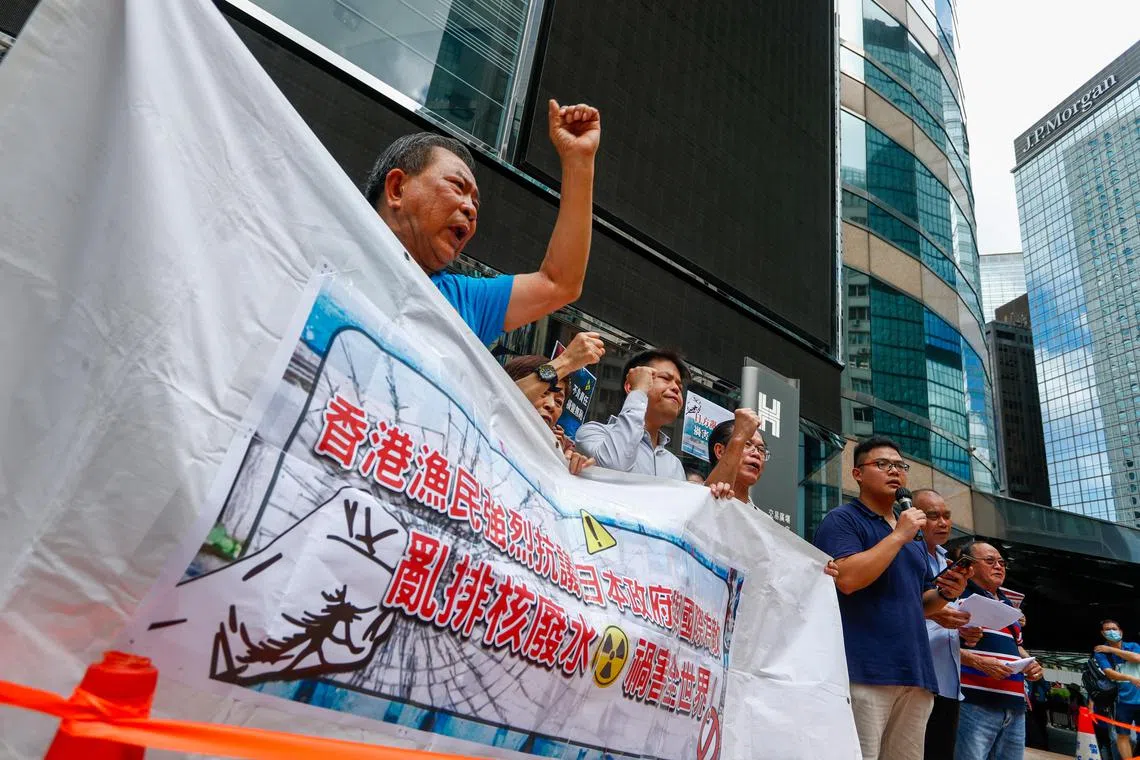Japan expects big hit from Hong Kong, Macau ban on most of its seafood
Sign up now: Get ST's newsletters delivered to your inbox

Hong Kong fishermen protesting against the discharge of Fukushima treated water, outside the General-consulate of Japan, in Hong Kong, on Aug 23, 2023.
PHOTO: EPA-EFE
Follow topic:
TOKYO - Japan expects a “significant” impact from the seafood import ban by Hong Kong and Macau due to the upcoming release of treated water
Japan is to start releasing more than one million metric tonnes of treated water from the destroyed Fukushima nuclear power plant into the sea on Thursday, more than a decade after the accident and amid harsh criticism from China.
China, the biggest importer of Japanese seafood, will take measures to protect its marine environment, food safety and public health, the Foreign Ministry said on Wednesday. Beijing has already banned imports from some Japanese regions.
In the latest set of measures, the Asian financial centre of Hong Kong and the gambling hub of Macau – both special Chinese regions – will ban aquatic product imports from 10 Japanese regions including Tokyo and Fukushima from Thursday.
The impact of the Hong Kong and Macau seafood bans could not be immediately calculated but would be “significant”, said the official at MAFF who declined to be identified due to the ministry’s policy.
China, also Japan’s top scallop buyer and a major consumer of sea cucumbers, imported 87.1 billion yen (S$813 million) worth of Japanese seafood in 2022, or a fifth of Japan’s total seafood exports, according to the MAFF data.
Hong Kong, Japan’s second-biggest seafood market after mainland China, which the ministry calculates separately, bought 75.5 billion yen worth of seafood from Japan, the data shows. Japan seafood export data includes pearl exports.
While strongly criticising the water release, China has allowed another nine companies from Russia – which shares some fishery areas with Japan in the Pacific – to export aquatic products, bringing the total number of allowed exporters to 894 firms, Russia’s food safety watchdog said on July 31.
Russia and China have questioned the Fukushima water release plan. Japan has said the feedback from the two was “unsupported by any scientific evidence”, adding that pollution levels in the water will be below those considered safe for drinking under World Health Organisation standards.
Japan’s top fishery lobby has said it feared reputational damage from the water release, which Japan says is safe and has been practised by other countries. The government would be ready to suspend the release if unusually high concentrations of radioactive materials are detected. REUTERS

